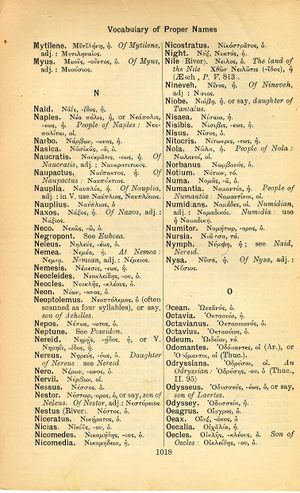Numantia
ὅσῳ διαφέρει σῦκα καρδάμων → as different as chalk from cheese, different as chalk from cheese, apples and oranges, like apples and oranges, by as much as cardamom is different from figs
English > Greek (Woodhouse)
Νομαντία, ἡ.
People of Numantia: Νομαντῖνοι, οἱ.
Latin > English (Lewis & Short)
Nŭmantĭa: ae, f.,
I a city in Hispania Tarraconensis, captured and destroyed by Scipio Africanus the Younger, now Garray, Liv. Ep. 47; 54 sq.; Cic. Off. 1, 11, 35; Flor. 2, 18; Eutr. 4, 17; Mel. 2, 6, 4.—Hence,
II Nŭmantīnus, a, um, adj., Numantine. De Numantino foedere, made by C. Mancinus, but not ratified by the Senate, Cic. Rep. 3, 18, 28; id. Fin. 2, 17, 54.—Subst.: Nŭ-mantīnus, i, m., a surname given to Scipio Africanus, as the taker of Numantia; cf. Ov. F. 1, 596.—In plur. Nŭ-mantīni, ōrum, m., the Numantines, Juv. 8, 11; Liv. Ep. 59.
Latin > French (Gaffiot 2016)
Nŭmantĭa,¹² æ, f., Numance [ville de la Tarraconnaise] : Cic. Off. 1, 35 ; Liv. Per. 47 || -tīnus, a, um, de Numance : Cic. Rep. 3, 28 ; Fin. 2, 54 || -tīnī, ōrum, m., les habitants de Numance : Juv. 8, 11 ; Liv. Per. 59.
Latin > German (Georges)
Numantia, ae, f., Stadt im tarrakon. Hispanien, vom jüngeren Scipio Afrikanus belagert u. zerstört (133 v. Chr.), wahrsch. j. Ruinen bei Puente de Don Guarray, Liv. epit. 47 u. 54 sq. Flor. 2, 18. Eutr. 4, 17. Cic. de off. 1, 35. – Dav. Numantīnus, a, um, numantinisch, bellum, Cic. u. Sall.: miles, viri, Flor.: foedus, des Mancinus, Quint. – Plur. subst., Numantīnī, ōrum, m., die Einwohner von Numantia, die Numantiner, Cornif. rhet. u.a.

